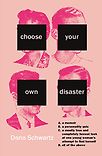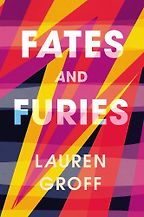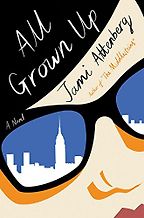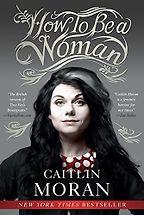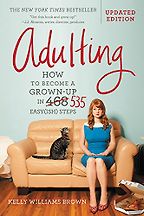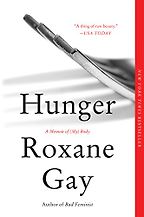What is it about our twenties that makes them such a raw and defining period in our lives?
It’s the first time in your life when you have so much freedom. You start to finally feel like an adult. From the age of twenty-one, you’re allowed to legally drink in America. But especially when in college you’re in this bubble where consequences seem like they don’t exist. Obviously not for real things—but you can stay up all night; you can have cereal for every meal; you can choose what you want to study and major in. You really get this sense that your future is of your own making—that you can decide what you want to do, and how you want to live it, and it’s all in your hands. That’s huge and terrifying responsibility. On one hand, that’s really empowering, but on the other hand, that can be incredibly overwhelming.
Yes. I’m 32 now, but remember that time vividly. Suddenly, I had to ask myself: ‘How should I live?’ Can books help us, when our life is in flux? And what are we looking for in those books: solace, or an instruction manual?
In the list I curated, I’ve found that it’s a bit of both. In Adulting, it’s literally how to write a thank you note, here’s how to clean your bathroom, here’s how to do the things you didn’t realise your mom was doing that now you need to do, which everyone sometimes needs a reminder of. But then there’s books like Fates and Furies by Lauren Groff, which can make relationships seem more real and can remind you what passion and art feel like.
It’s a cliché to say you can see the real world reflected in literature, but I think seeing either yourself or who you want to be in a book is incredibly comforting and instructive. The books that I connect with are the ones that say the things that I didn’t even know needed to be said.
Yes. When I was 17 I went on holiday and got a full-body sunburn. I realised then that until that point I’d never really believed in sunburn, or that it could happen to me. My mother had always been there, reminding me to apply sunscreen, so it had just never happened.
For me—this is so embarrassing—it’s cleaning my shower. The shower is supposed to be clean! The shower cleans me! Why do I need to clean it?
Your latest book Choose Your Own Disaster is written in a very unusual format. What made you decide that a ‘choose your own adventure’ book would be a good form for memoir?
Usually I hate reading books in the second person. It is very difficult, for me, to want to continue reading a book like that. I challenged myself: ‘Can I do this without seeming super annoying?’ I was fully ready to abandon it after the first chapter. But then I read it, and thought that it worked. When you’re in your twenties, it is the stage that you make the decisions that seem to have the biggest rippling effect for the rest of your life. You’re choosing what to study in college; you’re choosing where to live; you’re choosing who your friends are. These are decisions that will affect you for the rest of your life, and it’s strange that there may not be another condensed period of time where you’re making so many important decisions that can define your identity. So that’s why the ‘choose your own adventure’ form was important to me.
“Writing a memoir in the second person meant I could dissociate myself from the person I used to be”
Writing a memoir in the second person meant I could dissociate myself from the person I used to be. I wasn’t saying ‘I’—I could separate myself. It’s been two years since I wrote this book, and two years before that since I made those decisions. I’ve changed a lot. I’m not the same person I was. Being able to hold that person separately, and look at them with sympathy and understanding, but not necessarily feel like I have to be the same person I was then, was really helpful to me, in a strange way.
You run a satirical Twitter account, Guy in Your MFA, and have teased people who might ostentatiously be writing ‘experimental novels.’ Yet this is an experimental form: it has multiple end-points; it’s in the second person. Did you think of it like that?
It’s so interesting that you say that, because I didn’t think of it as ‘Experimental’ with a capital-E while I was writing it. Probably because I have this internalised misogyny where I think, ‘If I’m a woman writing about myself, it shouldn’t be held up to anything.’ But definitely while I was structuring it, I reached a moment when I realised, ‘Oh! This is really difficult.’ Thank goodness for my kind roommate in New York. While I was writing this, I had all the stories and forking paths on notecards. I took up our entire kitchen floor visually building the tree. She gracefully and kindly stepped around notecards for two weeks.
You mention early on in your memoir about being categorised—dismissed, really—as ‘a commercial writer.’ You’ve also written a YA novel—a genre which is often very innovative in form, switching voices, playing with flashbacks or flash forwards, taking epistolary form. Is there a tendency to underestimate female memoir and YA fiction?
Absolutely. I wrote a piece for the Washington Post while I was promoting this book about reading that my book had been categorised as a ‘guilty pleasure.’ This seemed very strange to me, because the themes it discusses are not light and frothy. I mean, hopefully it’s funny, but there are some very heavy themes in there.
“The decisions they make in their early twenties extend through their late fifties and until their deaths”
Culturally, we have this knee-jerk reaction to categorise fiction or nonfiction for and by women as a ‘guilty pleasure,’ as a way of apologising for being a woman—as a way of saying, ‘I know, I know. Girls read this, but I like it, too! I’m sorry!’ I want to break that habit. That’s why I was so offended and insulted when a professor called me a ‘commercial writer.’
I realise it’s not because it’s a bad thing to be a commercial writer—if this thing sells, God bless, that would be great—but it was how he said it. He thought it was an insult. He thought that being a good literary writer was completely antithetical to reading things that people wanted to read, which is a weird dichotomy to build.
Let’s talk about Lauren Groff’s Fates and Furies. This sold brilliantly, and is also one of Barack Obama’s favourite books. Why do you want to discuss it in this context?
One, because I love it. If you haven’t read it yet, you absolutely need to. But the reason I thought it was important for navigating your twenties is that we see these two characters throughout their lives. We see how the decisions they make in their early twenties extend through their late fifties and until their deaths. It’s also one of the most realistic depictions of a relationship I’ve seen in a book. So often in books, we either get the characters who are destined to be together, and they get together and that’s the end. Or, we see the dissolving of a marriage or a love. It was incredibly powerful to read a story about a growing love, and how there are cracks in the façade. These two people are incredibly relatable in different ways, and every young person should have that relationship not as a model, but as an example.
Fates and Furies is divided into two parts, each told through a different pair of eyes.
I was sad when the first narrative ended, because I thought, ‘I was just getting into his head!’ But Groff gets back in my good graces immediately with an equally compelling character in Mathilde. Also, when you’re a young person you can be incredibly narcissistic. Fates and Furies does this amazing thing of forcing you to slip every interaction and recognise that you’re not the only one in that relationship, and that the other person also has a backstory and internal life that you should pay attention to.
Let’s talk book two: All Grown Up by Jami Attenberg. It’s been described as the ‘anti- having-it-all novel.’ Does that sound right to you?
Yeah! What I love about this book is it’s a character who turns 40. She’s single; she doesn’t have the career success she probably wanted to when she was 20. If I go beyond that, I’ll poke into the narrative and spoil it. But it’s important that people can recognise that success doesn’t always look like you thought it was going to look like. Having a partner is not always the highest goal that you should be striving for.
Get the weekly Five Books newsletter
Jami Attenberg is phenomenal at building these dark, sympathetic characters who often are alone, but happy in being alone. They aren’t constantly searching for a boyfriend. Spoiler-alert: in my book, I spent my early twenties really thinking that if I had the right partner, I’d become the right person. I thought, ‘As soon as I find a person who wants me, then everything I want will fall into place.’ It turns out that’s not the case—who would have guessed? But reading Jami Attenberg, especially All Grown Up, really speaks to that in a funny and incredibly helpful way.
In the book, she describes her friend’s life as “elegant and angular, a beauty to behold,” contrasting it to her own: “a stew, a juicy, sloppy mess of ingredients and feelings and emotions, too much salt and spice, too much anxiety… But have you tasted it? Have you tasted it. It’s delicious.” I love that. She’s not looking for sympathy.
Yes. It’s unapologetic in the best way. You can be single and live life on your own terms, without children, without the things that society says a woman is supposed to have, and be happy.
Speaking of being a woman, Caitlin Moran’s book How To Be a Woman is your third choice. What did you take from this book?
People feel very strongly about Caitlin Moran. There are some essays in her book I disagree with politically. But it’s an exercise in being unapologetic. She writes with such fire and conviction. I want every woman in the world to express that with her own beliefs. It was the first time I read a book and thought, ‘We’re allowed to say that? I’m allowed to say these sorts of things?’ That’s what people should take away from that book: how much fire is in her prose.
This book covers many ‘offstage’ aspects of female sexuality. She discusses masturbation, and unsatisfactory sex with men she doesn’t like. In the acknowledgements of your own book, you thank every man you’ve ever slept with. Why?
Trying not to be ashamed. There’s still a cultural stigma against women having sex with multiple partners. I’d shamed myself for it, thinking that every man I’d slept with was supposed to fall in love with me, was supposed to be a prince that would sweep me off my feet and bring me to the castle. Coming to terms with the fact that you can get what you need in a night and learn from it, even if it’s painful, was really important in writing this memoir and sending it off into the world.
Moran writes about decisions she made that were based on various, competing visions of herself. Do you think that’s what this age is about? Trying on different identities?
Absolutely. That’s why I built my book around the idea of a personality quiz, because this is an age where we love categorising and putting a label on ourselves, and finding a clique or a group. I’m a Gryffindor, I’m a whatever. We love these quizzes that tell you who you are, because this is a time in your life where you don’t know who you really are. Plenty of these decisions were based on me pretending to be a certain type of girl.
You wrote of trying out the ‘character’ of the coquette. Do we grasp at stereotypes because we don’t know how to act?
Definitely. Because you don’t know who you are, and you don’t think you’re given permission to be yourself. No one knows what that even means! So you try different versions to see what works. To see what sticks.
Let’s move on to your fourth book, Kelly Williams Brown’s Adulting. We touched on this earlier: it’s a much more practical book.
Yes. Every twentysomething needs to have this book on the reference shelf next to the dictionary. It includes tips on how to write a thank you note, how to clean a bathroom, how to ask for a raise at work, what you’re supposed to do after a job interview. It’s the most practical guide to those little things you didn’t even know you didn’t know. There’s something in it that everyone should re-teach themselves.
“There’s a difference between being able to be a functional adult and being able to be a good adult”
I know the phrase ‘adulting’ has sort of become a bit of a joke, in the sense of: ‘Why do you need to learn how to become an adult?’ But there’s a difference between being able to be a functional adult and being able to be a good adult who knows how to keep in touch with friends and maybe cook one dish.
Five Books interviews are expensive to produce. If you're enjoying this interview, please support us by donating a small amount.
I also think a personality I put on briefly was ‘the mess who doesn’t know how to live her life’—part of that is even in the title to Choose Your Own Disaster. But the fact of the matter is that that’s not a super charming person to be, and I want to be someone who knows how to roast a chicken and write a thank you note.
This word ‘adulting’—do you think there’s something infantilising about it? The author was 28. She could feasibly have three kids at that age. Are we, as a generation, just immature?
That is a question that I’ve wrestled with in my head. By my age, my mom had met my dad and begun setting up her family. I don’t know if it’s that we’re immature, but we have moved the goalposts for what it is we want to accomplish. Women are, in a good way, pickier with their significant others—you don’t have to marry young and pop out three babies by the time you’re thirty. It’s a win culturally for women in general that we have more time to explore our potentials before we’re just relegated into being mothers. And once we’re mothers, the universe is still open to us. What’s often attributed to a lack of maturity should also be attributed to some cultural wins—that we don’t need to get married by twenty-one; you’re not old by twenty-five.
There’s a self-deprecating humour to this book—a whole section called ‘Procuring Food So You Don’t Die,’ for example.
Yeah, it’s a funny book. I think I gave it to my high school friends for graduation. It’s the perfect book: you don’t have to be embarrassed about the things you don’t know. Everyone has gaps in their knowledge. Everyone, even a generation ago. By addressing that conversationally and with humour, this book makes you feel like you’re okay for the things you don’t know, and we still have time to learn.
Finally, let’s talk Roxane Gay’s Hunger, a memoir of body image, obesity, food.
Roxane Gay is a brilliant writer. The way she’s able to express herself and her vulnerabilities in such an open and honest way is something I hope I was able to imitate in my work. But it’s a perspective on body that every young woman should read. So much culturally for women is tied up in our bodies: our worth, our sexuality. Culturally, we’ve been told that if our body isn’t a certain way, then you don’t have value. That’s an idea Roxane Gay—more eloquently than anyone—challenges and breaks down with humour and vulnerability.
Gay speaks as an obese woman, but do you think what she says about her body, the conclusions that she’s made, are universal?
Absolutely. Someone actually asked me a question the other day that I had to stop and think about. I had binge-eating disorder, but I lost the weight when I learned to curtail that behaviour. Someone asked: ‘Do you think that you could’ve written about this if you weren’t down to a societally acceptable weight?’ And I thought, I don’t know if I could have! I don’t know if I would have been brave enough to write about this if the problem was still ongoing and I didn’t fit a certain culturally accepted ‘look.’
That was just something I needed to stop and say, because I’m scared and I’m still vulnerable. All the things that I was ashamed of when I suffered from binge-eating disorder without telling anyone—that shame is still somewhere inside. Women are taught this shame from an early age. So, Roxane Gay’s writing and her acceptance of her body is something all women should learn from and emulate.
You have written very movingly in your book and elsewhere about having suffered multiple eating disorders. These conditions aren’t something that will disappear in your thirties and forties, and other aspects of ‘adulting’ won’t go away either. Is surviving your twenties simply a case of learning how to get by in life more generally?
That’s one way to look at it. But it’s also good to look at it as an opportunity: here’s the time where you can figure it out. Fortunately, food doesn’t have to be something you suffer from for the rest of your life. It can be something you’re able to get a hold of and embrace in a positive way.
Get the weekly Five Books newsletter
If you can make peace with your body in your twenties, that will set you up for a much happier thirties and forties. It’s still something I’m working on, but I know I wouldn’t have been able to write about it as openly and honestly as I did if there weren’t people like Roxane Gay teaching me how to do it.
How have you found the response to writing about anorexia and binge-eating disorder?
It has been incredibly gratifying, heartbreaking and heart-opening to hear how many girls—and boys—have suffered and haven’t been able to talk about it. Especially binge-eating disorder, which is so stigmatised and shamed, and seen as so embarrassing. I feel incredibly grateful for the people who are able to reach out to me and tell me that my words helped them in any way. These are issues that when light is shined on them, they become less shameful.
Finally: having now written this memoir of your twenties, do you look at yourself at the beginning of that period and recognise yourself? Or does it feel like another person?
I recognise myself, but I wouldn’t make those same decisions today, I think. There are aspects of myself, obviously, that have carried through, but at times I just want to give my past self a hug. I was really insecure and lonely a lot of the time, and I wish my past self could have read this book and realised that things will turn out okay.
Interview by Cal Flyn, Deputy Editor
August 17, 2018. Updated: March 10, 2023
Five Books aims to keep its book recommendations and interviews up to date. If you are the interviewee and would like to update your choice of books (or even just what you say about them) please email us at [email protected]

